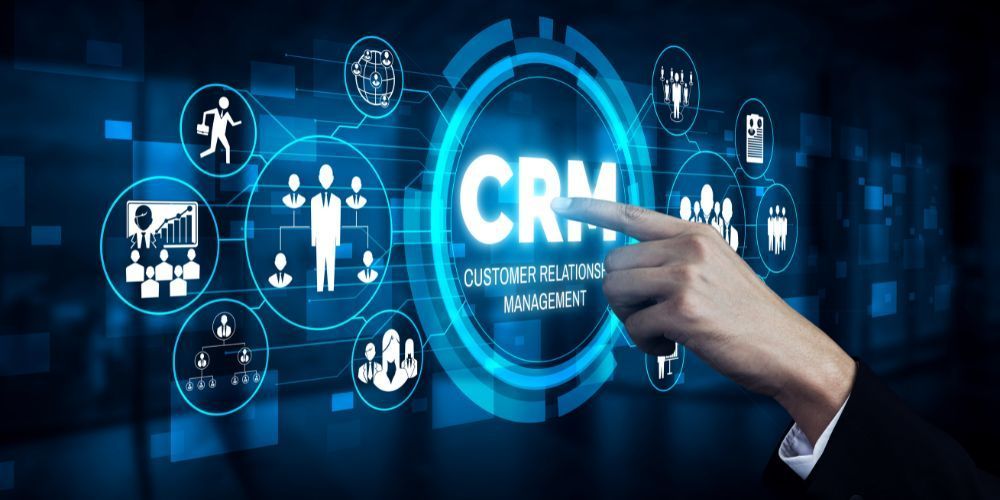AI in CRM Data Analysis: A Pharmaceutical Industry Perspective
Artificial Intelligence (AI) is reshaping Customer Relationship Management (CRM) systems across industries. In the pharmaceutical sector, AI-powered CRM systems hold unique significance due to their ability to manage complex healthcare provider (HCP) relationships, ensure regulatory compliance, and optimize patient support programs. With increasing pressure to maintain data security and privacy, AI offers scalable, efficient solutions that address the industry's intricate challenges while opening doors to new opportunities.

Key Benefits and Applications
The pharmaceutical industry faces distinct challenges, from maintaining compliance with strict regulations to managing extensive and varied datasets. AI-powered CRM systems not only address these challenges but also enable transformative improvements across multiple dimensions. By integrating advanced AI technologies, companies can enhance operational efficiency, provide highly personalized experiences, and make informed decisions grounded in real-time data.
Enhanced Data Accuracy and Cleaning
In pharmaceuticals, where data impacts patient care, compliance, and business operations, accuracy is paramount. Traditional manual methods of data cleaning are time-intensive and prone to errors. AI-powered solutions provide automated processes that ensure data integrity while reducing human oversight.
AI-Powered Agent Applications in Data Cleaning:
- Real-time updates and automated error correction in CRM systems.
- Context-sensitive flagging of anomalies for manual review.
- Proactive alerts for inconsistencies in HCP credentials or compliance documentation.
Advanced Customer Segmentation
Effective segmentation in pharmaceuticals goes beyond basic demographics. AI enhances the process by analyzing prescribing behaviors, research interests, and patient populations in real-time. AI-powered agents dynamically update segmentation strategies based on observed trends, ensuring more effective targeting for marketing and medical science liaison (MSL) teams.
AI-Enhanced Segmentation Capabilities:
- Continuous refinement of HCP groups using interaction data.
- Automated updates to engagement strategies based on prescribing patterns.
- On-demand insights for MSLs and sales representatives.
Predictive Analytics and Insights
Predictive analytics transforms large datasets into actionable insights. For pharmaceutical companies, these capabilities translate into improved decision-making, optimized resource allocation, and better engagement opportunities. AI-powered agents amplify predictive analytics by enabling real-time actions based on forecasted trends.
Key Predictive Applications:
- Automating recommendations for outreach based on prescribing trends.
- Intelligent scheduling for high-impact HCP visits.
- Real-time risk assessments for patient adherence and therapy discontinuation.
Practical Applications
The integration of AI and AI-powered agents in pharmaceutical CRM goes beyond theoretical benefits, translating into tangible improvements in operations. These tools empower teams to automate routine tasks, streamline workflows, and provide hyper-personalized engagement.
Orchestration and Personalization
Personalized engagement is critical for building trust and fostering long-term relationships in pharmaceuticals. AI-powered agents enable real-time recommendations, ensuring each interaction aligns with HCPs' needs.
Examples of AI-Powered Personalization:
- Tailored educational content delivered during MSL engagements.
- Immediate follow-up actions suggested post-interaction.
- Real-time adjustment of outreach strategies during live conversations.
Sales and Medical Affairs Operations
Sales and medical affairs teams benefit from AI-driven tools that improve efficiency and precision. AI-powered agents enhance these operations by offering context-aware insights and automating post-engagement activities.
Capabilities in Sales and Medical Affairs:
- Real-time engagement insights to tailor discussions to provider preferences.
- Automated follow-ups, including summaries and next steps.
- Performance analysis to refine engagement strategies.
Patient Support Programs
Patient support programs require a balance of scalability and personalization. AI-powered agents enable companies to deliver consistent, timely support to patients while freeing up resources for complex cases.
AI in Patient Support Programs:
- Real-time alerts for therapy adherence risks.
- Automated, personalized education materials.
- Efficient handling of routine inquiries.
Addressing Data Challenges Unique to Pharmaceuticals
The pharmaceutical industry faces distinct data challenges that require specialized AI approaches. These challenges stem from the complex, sensitive, and highly regulated nature of healthcare information, as well as the global scope of pharmaceutical operations.
Managing Unstructured Clinical Data
Clinical interactions generate vast amounts of unstructured data that traditional CRM systems struggle to process efficiently:
- Advanced NLP for Clinical Notes: AI-powered systems can extract meaningful insights from physician notes, clinical observations, and patient-reported outcomes
- Medical Terminology Standardization: Intelligent mapping of varied clinical terminologies (MedDRA, SNOMED CT, ICD-10) to enable consistent analysis across data sources
- Multimodal Data Integration: AI systems that can process and correlate imaging data, genomic information, and clinical narratives alongside traditional CRM data
Data Harmonization Across Global Healthcare Systems
Pharmaceutical companies operate across diverse healthcare ecosystems, each with unique data structures:
- Intelligent Data Normalization: AI-driven processes that standardize patient journey information across different healthcare delivery models
- Cross-Border Data Reconciliation: Automated systems that align physician identifiers and institutional hierarchies across national boundaries
- Adaptive ETL Processes: Machine learning algorithms that continuously improve data extraction and transformation from disparate healthcare systems
Privacy-Preserving Analytics
Pharmaceutical data requires exceptional privacy protections while maintaining analytical utility:
- Federated Learning Models: AI approaches that allow analysis across institutions without centralizing sensitive data
- Differential Privacy Implementation: Mathematical frameworks that enable population-level insights while protecting individual privacy
- Synthetic Data Generation: AI-powered creation of realistic but non-identifying datasets for system development and testing
Real-World Evidence Integration
Connecting CRM data with real-world evidence presents unique challenges:
- Patient Journey Reconstruction: AI algorithms that connect fragmented care episodes across multiple data sources
- Evidence Quality Assessment: Automated evaluation of data provenance and reliability for decision-making
- Longitudinal Data Linkage: Privacy-preserving techniques to connect pre- and post-launch patient experiences

Expanded Regulatory Considerations
Implementing AI-powered CRM systems in the pharmaceutical industry requires careful navigation of stringent regulations that extend beyond general data protection frameworks like GDPR and HIPAA. Ensuring compliance in automated processes is critical to maintaining trust and avoiding legal penalties.
Pharmaceutical-Specific Compliance Considerations:
21 CFR Part 11 Compliance: AI systems must maintain electronic record integrity through appropriate validation, audit trails, and electronic signatures. This includes:
- Automated documentation of algorithm changes and validation protocols
- System architecture that preserves the chain of custody for all data modifications
- Built-in controls that prevent unauthorized access to regulated data
Adverse Event Reporting: AI-powered CRM systems offer transformative capabilities for pharmacovigilance:
- Automated scanning of customer interactions to identify potential adverse events
- Natural language processing to extract relevant safety information from unstructured data
- Intelligent routing of safety signals to appropriate personnel within mandated reporting timeframes
- Proactive monitoring of social media and digital channels for emerging safety concerns
Global Marketing Compliance: Pharmaceutical CRM systems must navigate variable regulatory environments:
- Region-specific content controls that automatically adjust messaging based on local regulations
- AI-driven approval workflows that adapt to different regional requirements
- Automated tracking of off-label discussion risks during HCP engagements
- Dynamic content management that ensures promotional materials remain within approved guidelines
Sunshine Act and Transparency Reporting: AI enhances accuracy in value transfer reporting:
- Automated categorization of HCP interactions and associated expenses
- Predictive analytics to identify potential reporting discrepancies before submission
- Integration with expense management systems for comprehensive compliance documentation
Data Privacy: AI systems must anonymize patient data and implement encryption standards to safeguard sensitive information.
Transparency: Companies must ensure that AI algorithms are explainable and auditable, reducing the risk of unintentional bias in decision-making.
Integration with Compliance Systems: AI-powered CRM systems should seamlessly integrate with compliance platforms to automate monitoring and reporting.
Future Trends
As AI capabilities evolve, the pharmaceutical CRM landscape will undergo significant transformation. Industry-specific applications will extend beyond current implementations to reshape fundamental aspects of stakeholder engagement and commercial operations.
Advanced KOL Identification and Engagement
The traditional approach to key opinion leader management will evolve dramatically:
- Dynamic Influence Mapping: AI systems that continuously monitor scientific discourse, social media, and publication patterns to identify emerging thought leaders in real-time
- Precision Engagement Planning: AI-powered recommendations that optimize timing, channel, and content for each KOL interaction based on behavioral patterns and preferences
- Collaborative Intelligence: Systems that identify cross-disciplinary KOL networks to support increasingly complex therapeutic approaches
AI-Orchestrated Global Product Launches
Launch excellence will be redefined through AI-powered coordination:
- Predictive Launch Sequencing: AI models that optimize global launch timing based on approval probabilities, market readiness, and competitive landscapes
- Adaptive Field Deployment: Real-time adjustment of commercial resources based on early adoption signals and regional variations
- Cross-Functional Synchronization: AI systems that coordinate medical, commercial, and market access activities with unprecedented precision
Predictive Modeling for Market Access
AI will transform the approach to formulary and reimbursement strategies:
- Payer Decision Simulation: Advanced modeling of payer behavior using historical data and economic factors
- Value Story Optimization: AI-powered analysis to identify the most compelling value messages for specific payer contexts
- Budget Impact Forecasting: Real-time projections of therapy adoption and resulting healthcare system impacts
- Outcomes-Based Agreement Monitoring: Automated tracking of real-world outcomes to support innovative contracting models
Integration with Decentralized Clinical Trials
The boundaries between clinical research and commercial operations will blur:
- Seamless Patient Experience: CRM systems that maintain relationships from clinical trial participation through treatment
- Site Selection Intelligence: AI-powered identification of high-potential investigators based on comprehensive practice patterns
- Real-World Data Feedback Loops: Continuous refinement of clinical protocols based on commercial phase insights
- Patient-Centric Trial Design: CRM-informed protocol development that optimizes participation and adherence
Additional Emerging Trends
- Real-Time Conversational Agents: Automating HCP engagement through dynamic, AI-driven conversations.
- Proactive Engagement Models: AI systems that predict and act on emerging engagement opportunities.
- Hyper-Personalized Patient Support: Delivering highly tailored, scalable solutions for patient care.
- Ethical AI Governance: Systems designed with transparency to enable regulatory examination of decision processes and continuous monitoring for unintended bias.
By adopting a phased implementation strategy, pharmaceutical companies can unlock the full potential of AI while mitigating risks.
Navigating the AI-Powered Future in Pharmaceutical CRM
AI and AI-powered agents in pharmaceutical CRM represent a significant advancement in managing healthcare provider relationships, ensuring compliance, and improving patient outcomes. The technology's ability to process complex healthcare data while maintaining regulatory compliance makes it particularly valuable in the pharmaceutical industry. As AI and agent capabilities continue to evolve, pharmaceutical companies that effectively implement these solutions will be better positioned to navigate the complex healthcare landscape while delivering greater value to healthcare providers and patients.
For pharmaceutical companies considering AI-powered CRM implementation, a phased approach focusing on specific use cases—such as compliance monitoring or healthcare provider engagement—can provide immediate benefits while building toward more comprehensive digital transformation. Success requires careful attention to data privacy, system integration, and change management, ensuring that technological advancement aligns with regulatory requirements and stakeholder needs.
How does AI-powered CRM improve regulatory compliance in the pharmaceutical industry?
AI-powered CRM systems enhance regulatory compliance through automated monitoring and reporting capabilities. They can scan interactions to identify potential adverse events, implement region-specific content controls, maintain 21 CFR Part 11 compliance through validated electronic records, and automate Sunshine Act reporting. These systems create audit trails for all data modifications, provide explainable algorithms for regulatory review, and continuously adapt to evolving compliance requirements across global markets.
What are the key implementation challenges for AI in pharmaceutical CRM systems?
The primary implementation challenges include data quality and integration issues across disparate healthcare systems, ensuring compliance with varied global regulations, addressing privacy concerns with sensitive patient information, securing stakeholder buy-in across medical and commercial teams, and managing change within regulated environments. Successful implementation requires a phased approach starting with specific use cases, strong governance frameworks, comprehensive validation protocols, and cross-functional collaboration between IT, compliance, and business units.
How can pharmaceutical companies measure ROI from AI-powered CRM investments?
Pharmaceutical companies should measure ROI through multiple metrics including increased HCP engagement rates, improved field force productivity, enhanced compliance accuracy, reduced operational costs, faster time-to-insight from data, improved market access outcomes, and ultimately, increased therapy adoption. An effective measurement framework combines quantitative metrics (such as engagement frequency and duration) with qualitative assessments (such as HCP satisfaction and team adoption). Companies should establish baseline measurements before implementation and track improvements across short-term operational efficiencies and long-term strategic advantages.










